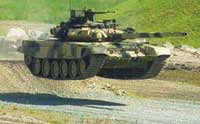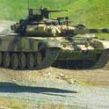
RUSSIAN TANKS WILL BE EQUIPPED WITH FRENCH IR TV
Publication: Eurasia Daily Monitor Volume: 5 Issue: 131
By:

It was announced this week that two top Russian generals have been ousted: the chief of the Main Operational Directorate of the General Staff Alexander Rukshin and the chief of Armed Forces Communications Eugeny Karpov. It was reported that the resignation of the Chief of the Organizational-Mobilization Directorate of the General Staff General Vasili Smirnof, who is in charge of the draft, may soon be accepted (RIA-Novosti, June 7). This major reshuffle of the top brass follows the ouster last month of Russia’s top general, First Deputy Defense Minister and Chief of the General Staff of the Armed Forces Yuri Baluyevsky (see EDM, June 5).
In Russia, the removal of top military leaders is traditionally followed by major rearrangements of subordinate generals, who in turn reshuffle the lower ranks, bringing in loyal personnel and ousting their predecessors’ appointees and supporters. It could have been expected that the new Chief of the General Staff Nikolai Makarov would oust the associates of Baluyevsky. Still, the present rearrangement of the top brass is drastic even by Russian standards and may, in fact, signal a significant shift in Russian defense policies.
The Main Directorates of Organization-Mobilization, Communications and Operations of the General Staff are the core of the Russian military organization. The Operational Directorate has, among other things, the on-line command of the nuclear deterrent. Last March the Russian media reported that Baluyevsky, supported by other top generals of the General Staff, openly opposed the plans for military reforms proposed by Defense Minister Anatoly Serdyukov. This “general’s rebellion” was reportedly followed by letters of resignation in protest by top generals. General Rukshin was specifically mentioned as opposing Serdyukov’s plans to cut the number of military personnel in the Defense Ministry and replace them with civilians (Izvestia, Nezavisimaia Gazeta, March 24; Trud, March 25).
Rukshin was also known as a hard-line general, who favored massive additional spending of Russia’s newfound oil wealth to rebuild Russia’s military to face the West. Rukshin publicly supported the continuation of the Soviet concept of perimeter defenses, of “creating self-sufficient military groupings in all strategic directions,” and of retaining the Cold War capabilities to mobilize a mass multimillion-strong armed force (Nezavisimoye Voyennoye Obozreniye, February 3, 2007).
In March the Defense Ministry denied the existence of a “general’s rebellion” or the possibility of high-ranking resignations (Kommersant, March 27). Now the resignations have happened and it is clear that the reports of a serious confrontation in the Defense Ministry were accurate. It’s also clear that the standoff has been resolved with a resounding victory by Serdyukov.
In April 2007 Serdyukov appointed the present Chief of General Staff Makarov to be Deputy Defense Minister in charge of procurement and armaments. Last week Vladimir Popovkin, 51, the Chief of the Space Troops, was appointed to Makarov’s former position to oversee procurement (Kommersant, July 4). Because NATO was considered Russia’s main potential opponent, it has been the official Russian defense procurement policy up to now not to buy Western-made weapons or components, despite the inability of the country’s defense industry to make modern weapons on its own,. Last January Popovkin was the first Russian general to disclose publicly that Russia was widely using foreign components to make military satellites but did not buy U.S. space-quality electronics, since they might be sabotaged by secret “insertions.” Russia, according to Popovkin, was secretly obtaining cheap replacements not designed for satellite use from other sources and the satellites turned out faulty (Nezavisimoye Voyennoye Obozreniye, February 1).
This week Popovkin announced during an arms show in Nizniy Tagil in the Ural region that a contract had been signed with French company Thales to provide 25 new T-90S tanks with infrared TV cameras. According to the official arms trader Rosoboronexpot, the contact is worth several million dollars and “the tanks will be able to fire accurately at night.” Popovkin announced, “Modern military equipment is so complex, that we will need foreign know-how, while continuing our own military research” (RIA-Novosti, July 9).
Russian armor for export to Third World nations has already been equipped with French IR cameras. The Russian army today has over 20,000 tanks, none of which can fire accurately at night or in fog, because of the official policy of defense self-sufficiency. The planned procurement of the new modernized French 25 T-90S tanks will not in itself alter the situation significantly, but it represents a major policy change. The modernization of Russia’s backward military is impossible without defense cooperation with the West, and it seems that Serdyukov has found allies within the top brass who are ready to acknowledge this fact and move in the right direction. Popovkin has announced that by 2016 Russia will have a “new, model, one-million-strong military” (RIA-Novosti, July 9). Maybe Popovkin and Serdyukov indeed mean what they say.




